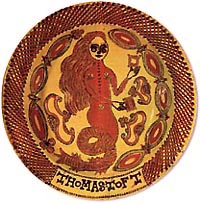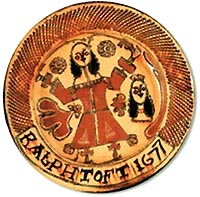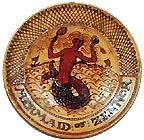| Thomas Toft
17th C English Slipware Maker
 Staffordshire,
in particular Burslem, was a center for earthenware slipware manufacture
between 1670 and 1730. It was here that Thomas Toft is said to have
made his slipware dishes, of which about 30 are still known to exist.
Another famous slipware maker of the 'Toft' family, was Ralph Toft,
possibly Thomas Toft's brother or son, who is thought to have worked
around 1675. There was also a Cornelius Toft and James Toft. Staffordshire,
in particular Burslem, was a center for earthenware slipware manufacture
between 1670 and 1730. It was here that Thomas Toft is said to have
made his slipware dishes, of which about 30 are still known to exist.
Another famous slipware maker of the 'Toft' family, was Ralph Toft,
possibly Thomas Toft's brother or son, who is thought to have worked
around 1675. There was also a Cornelius Toft and James Toft.
Designs attributed to Thomas Toft include mermaids, unicorns, pelicans,
but also King Charles II and his wife Queen Catherine of Braganza,
and numerous coats of arms. A cross-hatched rim was fairly typical
of the style and was copied even in the 20th C.
Curiously, we don't really know if the makers of these wares were
actually called 'Toft'. Some historians, like W.B. Honey, maintain
that those slipware dishes may have been made for collectors
named 'Toft', which would be another explanation for the prominently
displayed name. A Thomas or Ralph Toft don't actually appear in
potters' annals of the time. It has also been suggested that the
name 'Toft' became so popular, that it was simply used by other
potters, essentially creating a 'Toft' genre.
 Be
that as it may, the Toft style, combined with the sliptrailing technique,
was firmly established in the Staffordshire area by the middle of
the 17th C. Other potters working in that style were Ralph Turnor,
William Talor, Ralph Simpson and Richard Meir. Be
that as it may, the Toft style, combined with the sliptrailing technique,
was firmly established in the Staffordshire area by the middle of
the 17th C. Other potters working in that style were Ralph Turnor,
William Talor, Ralph Simpson and Richard Meir.
Sometimes a red slip was trailled on to a lighter background, sometimes
vice-versa. Black and green slips were also used. According to the
common practice of the time, these earthenwares were glazed with
a galena lead glaze, giving them their characteristic yellow tinge.
 The
popularity of slipware declined at the beginning of the 18th C,
as feathering and marbling became more popular. In the 20th C, sliptrailing
experienced something of a revival, thanks to the efforts of English
potter Bernard Leach. The
popularity of slipware declined at the beginning of the 18th C,
as feathering and marbling became more popular. In the 20th C, sliptrailing
experienced something of a revival, thanks to the efforts of English
potter Bernard Leach.
Further reading: History
of World Ceramics
More Articles
More Pots of the Week
|